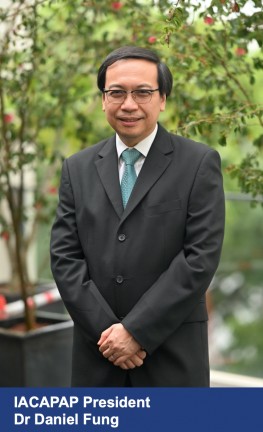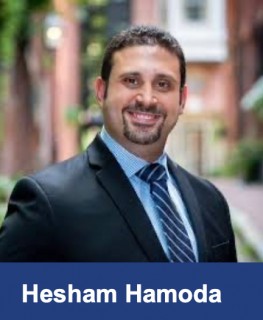IACAPAP President’s Message – March 2021 – IACAPAP: Starting a War in 2021
By: Dr Daniel Fung, IACAPAP President, Adjunct Associate Professor, Lee Kong Chian School of Medicine Singapore

This is the new year of 2021. As an ethnic Chinese, we also celebrate the Lunar New Year from 12th of February 2021. This heralds the beginning of Spring and a tradition done on this festival is to first gather the family for a reunion dinner the night before, followed by a series of visits to the most senior members of the family and exchange greetings and red packets (containing money) as a show of respect and good wishes. I have celebrated the Lunar New Year in this manner since I was a child and every year it is different because of the cycle of Chinese Zodiac signs. There are 12 of these signs and I was born in the year of the Horse but 2021 is the year of Ox. Each Zodiac sign is a represented by an animal and each animal has a specific characteristic. The Ox is a symbol of diligence, persistence and honesty so presumably this will be a good year, perhaps in the future, be seen as the year post COVID 19 pandemic.
With this backdrop, I would like to first gather my thoughts and reminisce on the years gone by. I do look forward to a reunion of the first aims when I took on the office of President of IACAPAP. It was 2018, we had planned a retreat in Paris that year, which was threatened by civil unrest in Paris, but we persevered and met. We planned a follow up retreat in Frankfurt in beginning of 2020 and 75% of us made it but I was not able to travel by February, so it was a hybrid meeting with me appearing virtually. Of course, we all know that it’s now almost impossible to travel and our last retreat about a week ago in 2021 was completely virtual.
With all this in mind, I would like to focus on a part of our mission that we seldom speak about the issue of advocacy. An advocate is defined as someone who speaks on behalf of another. Usually, advocates are lawyers who help their clients plead their case in a court of law. But when we use the term advocacy in non profit organisations, we are speaking of making representations for a cause. Our constitution has the word in it and I believe that our founding leaders had something specific in mind. This is because our cause is the mental health of the children in the world. Children often have their voices drowned out by other competing voices. They of course, do not have a loud voice in the first place. This is evident from several angles. The British Royal Society for the prevention of cruelty to animals was formed more than 60 years before anyone

even thought a society for the prevention of cruelty to children was needed. Paediatric services in healthcare have often been secondary to adult services for a long time. The first children’s hospital was built in Paris in 1802 even though there were many hospitals for adults more than 100 years before. Funding for children’s services by Governments is always much smaller relative to the populations of children themselves. In 2019, the US federal spending on children amounted to $408 billion, or 9 percent of the federal budget. Apart from having a small voice, children also cannot vote. More than 30 years ago, the United Nations developed a treaty called the Convention for Children’s Rights to hopefully allow their voices to be heard and yet not every country in this present world has ratified that convention. So, the reason for our advocacy is well laid out. But have we truly taken on this issue by the scruff of the neck? Perhaps not. How can we do this better? I offer several suggestions.
We need to speak about children rights to our governments. Many of the association members in IACAPAP are professional guilds representing child psychiatrists. We may be more concerned about setting professional standards and the ethics of our practice, but we have a responsibility to build a better world for our children. If all we do is treat mental illnesses in children, we might as well be a car mechanic repairing the vehicles that have broken down. We want to be the engineers that design better cars for the future. Which means we must think of the social determinants of mental illness and the adverse childhood experiences that cause childhood and eventually adult mental illnesses in the first place. We must do better for protecting children and their development in the critical and sensitive periods.
We need to rally together as a community of practitioners to develop mental health interventions for preventing mental illness and promoting resilience that is evidence informed. I dare not say evidence based because it may be hard to get to that standard but we certainly have enough evidence to suggest that so much can be done to reduce abuse, neglect and bullying in environments that children grow up in. We can do this together with other like-minded organisations, not just with psychiatrists. We need to work across disciplines and also across the world. Many lower- and middle-income countries do not have many professionals caring for children so we need to extend our advocacy to those areas as well. In the past, this would be difficult but in today’s connected world, it could be done virtually, in an instance.

We are starting a new way of reaching out to the world using the technology that we have before us. This journey started 10 years ago and has gone from strength to strength. I drew that engineering analogy because the child mental health professional of the future is a digital warrior. Using the digital road map as the blueprint for our strategy moving ahead, we hope to improve our global communications in ways that we have not been able to. Dr Hesham Hamoda is a living example of this and I hope that he will share more of his vision at our next World Congress in Dubai. Our first steps of this vision are now in place. We have identified a core professional congress organiser to carefully plan our future meetings which is likely to be in hybrid virtual and face to face concepts. We have already created an arsenal of online materials that can be embedded into a new portal with interactive capabilities to link our members, build up our membership and share our message widely. Our social media presence will also increase to “market” our intentions for advocacy. If you think that this is like a declaration of war. You may be right. We are starting a war against ignorance, poor parenting, and stress. Advocacy may be just that, a war to win the hearts and minds of our societies about the importance of the next generation.

